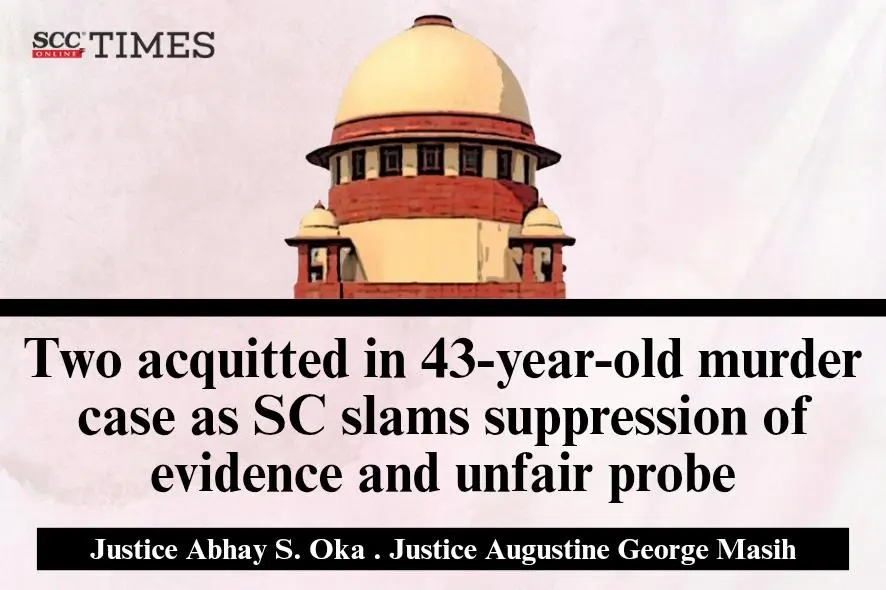Supreme Court: In a criminal appeal against Allahabad High Court’s decision in a 43-year-old murder case, whereby the conviction of the two accused persons for the offences punishable under Section 302 and Section 307 read with Section 34 of the Penal Code, 1860 (‘the IPC’), the Division Bench of Abhay S. Oka and Augustine George Masih, JJ. allowed the appeal and acquitted the accused persons.
Background
The First Information Report was registered in 1981 naming three accused persons for the offences. The case of the prosecution was that PW-4 was sleeping under a Babool tree, and the deceased was sleeping in his hut. The PW-4 woke up at 2 a.m. to the sound of a firearm being shot. The accused 1 was seen armed with a country-made pistol, 2 with a knife and 3 with a stick. The accused allegedly had a scuffle with the deceased and PW-7, who were allegedly in an illicit relationship.
The Trial Court convicted accused accused 1 and 2 of the offences alleged against them, and a sentence of life imprisonment was imposed. The Trial Court acquitted the third as he had only held a stick, and no injury marks were found on the deceased. In appeal, the High Court confirmed the Trial Court’s decision.
Analysis and Decision in 43-year-old murder case
The Court carefully scrutinised the testimonies of key prosecution witnesses, especially PWs 4, along with medical and defence evidence. Notably, the prosecution relied heavily on the eyewitness account of PW-4. However, the Court found that PW-5, PW-6 and PW-7 had all submitted affidavits during the bail proceedings of the accused persons, exonerating them and attributing the incident to others. These affidavits were accepted by the Sessions Court while granting bail and were not adequately countered or investigated by the Investigating Officer (PW-10), despite having knowledge of their existence.
The Court observed that although defence witnesses had confirmed the affidavits’ execution, the prosecution failed to initiate any supplementary investigation, including thumb impression verification, or to record fresh statements under Section 161 of the Code of Criminal Procedure, 1973 (‘CrPC’) from the witnesses concerned. The explanation for this omission, that the witnesses could not be located, was rejected as inadequate, especially since no attempts were made to secure their presence under the provisions of the CrPC. This lapse, according to the Court, struck at the root of a fair investigation as guaranteed under Article 21 of the Constitution.
Furthermore, the Court found that no material contradictions or omissions had been brought out during the cross-examination of PWs 4 to 6. However, the delay in recording statements, extended custody of witnesses, and unexplained suppression of exculpatory affidavits created a serious doubt regarding the credibility of their in-court testimony.
The Court also noted that the weapon of offence had not been recovered. Weighing all these factors, it concluded that it would be unsafe to uphold the conviction solely based on the testimony of PW-4, especially when serious investigative lapses were evident and when exculpatory material had been deliberately withheld.
The Court held that the prosecution had failed to conduct a fair and complete investigation, thereby violating the constitutional safeguards guaranteed to the accused. It found that the High Court and the Sessions Court had overlooked crucial evidence, particularly the cross-examination of the Investigating Officer and the affidavits of PWs 5 to 7.
Accordingly, the Court allowed the appeal and set aside the impugned judgments of the Trial Court and the High Court insofar as the accused were concerned. The accused were acquitted of all charges, and their bail bonds were ordered to be cancelled.
[Sakhawat v. State of U.P., 2025 SCC OnLine SC 1205, Decided on: 23-05-2025]





